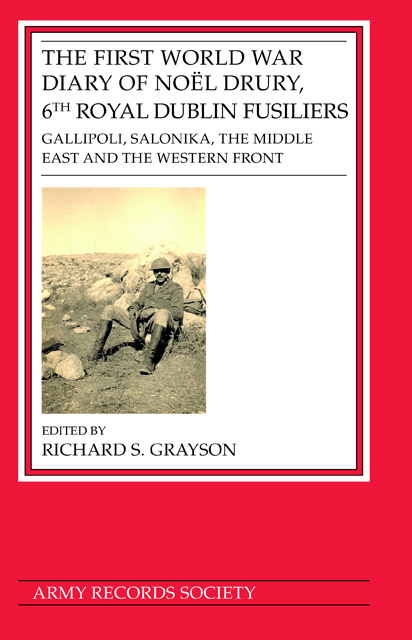 First World War Diary of Noël Drury, 6th Royal Dublin Fusiliers
First World War Diary of Noël Drury, 6th Royal Dublin Fusiliers Book contents
- Frontmatter
- Miscellaneous Frontmatter
- Contents
- List of Illustrations
- Acknowledgements
- List of Abbreviations
- Introduction
- 1 Volunteering and Training, September 1914–July 1915
- 2 The Voyage to the Dardanelles, July–August 1915
- 3 Gallipoli: Landing at Suvla Bay and the Next Ten Days, 7–17 August 1915
- 4 Gallipoli: Digging In, 18 August–October
- 5 The Serbian Front and the Battle of Kosturino, October–December 1915
- 6 The Salonika Front and Hospital, December 1915–September 1917
- 7 Egypt and Palestine, September–December 1917
- 8 Defending Jerusalem and the Battle of Tell ‘Asur, December 1917–July 1918
- 9 France, July–11 November 1918
- 10 Armistice, 12 November 1918– 11 March 1919
- Appendix 1 6th Royal Dublin Fusiliers leaving home for service overseas, 10 July 1915
- Appendix 2 The Effects of the Gallipoli Campaign on the 6th Royal Dublin Fusiliers
- Appendix 3 Officers of the 6th Royal Dublin Fusiliers at Hastière-sur-Meuse, Nov 1918
- Biographies
- Bibliography
- Index
7 - Egypt and Palestine, September–December 1917
Published online by Cambridge University Press: 14 June 2023
- Frontmatter
- Miscellaneous Frontmatter
- Contents
- List of Illustrations
- Acknowledgements
- List of Abbreviations
- Introduction
- 1 Volunteering and Training, September 1914–July 1915
- 2 The Voyage to the Dardanelles, July–August 1915
- 3 Gallipoli: Landing at Suvla Bay and the Next Ten Days, 7–17 August 1915
- 4 Gallipoli: Digging In, 18 August–October
- 5 The Serbian Front and the Battle of Kosturino, October–December 1915
- 6 The Salonika Front and Hospital, December 1915–September 1917
- 7 Egypt and Palestine, September–December 1917
- 8 Defending Jerusalem and the Battle of Tell ‘Asur, December 1917–July 1918
- 9 France, July–11 November 1918
- 10 Armistice, 12 November 1918– 11 March 1919
- Appendix 1 6th Royal Dublin Fusiliers leaving home for service overseas, 10 July 1915
- Appendix 2 The Effects of the Gallipoli Campaign on the 6th Royal Dublin Fusiliers
- Appendix 3 Officers of the 6th Royal Dublin Fusiliers at Hastière-sur-Meuse, Nov 1918
- Biographies
- Bibliography
- Index
Summary
The UK's central strategic concern in the Middle East was the defence of the Suez Canal. Since it opened in 1869 the canal had been an artery for imperial communications, not only but especially on the routes to India and Australia. During the war, it was also vital for supplies first to Gallipoli and then to the Salonika front. More widely, Egypt was an important supplier of cotton and food, while Alexandria and Port Said were crucial staging posts for keeping the Salonika campaign resourced.
Threats to the canal, and the reasons for a strong British presence in Egypt, came from two sources: Turkey and pan-Islamism. Prior to the First World War a British strategic aim in the Middle East had been to preserve the Ottoman Empire in the name of stability and to prevent Russian expansion, partly by urging internal reforms to strengthen it against critics. However, when the Ottomans attacked Russia at the end of October 1914 and joined the war on the side of the Central Powers, British war aims shifted. They now became to transform the Ottoman Empire into a federated state, containing provinces which would be autonomous, although the French and the Russians aimed to break it up entirely. The place at which such aims would be fought over was in Palestine, bordering Egypt and which the Ottomans had controlled for almost 500 years. The complexity of the situation can be seen in Egypt's legal status. Sovereignty was notionally Ottoman, but it had been under British military occupation since 1882. When war broke out, the Egyptian figurehead, the Khedive Abbas Hilmi II, declared for Turkey. He was deposed and replaced with a pro-British nephew, Hussein, and Egypt was declared to be a British Protectorate. This meant an end to any illusion that the British were merely in Egypt in a supervisory role, and that from now on, they would control the defence of Egypt as they wished. Meanwhile, the British feared ‘pan-Islamism’ on the basis that the Muslim population of Egypt (and elsewhere) might side with their co-religionists in the Ottoman Empire and threaten Britain's control of the areas it occupied. One method for dealing with this in Egypt was that the declaration of the British Protectorate included an assurance that no Egyptian would be required to fight to defend the country.
- Type
- Chapter
- Information
- First World War Diary of Noël Drury, 6th Royal Dublin FusiliersGallipoli, Salonika, the Middle East and the Western Front, pp. 178 - 215Publisher: Boydell & BrewerPrint publication year: 2022


